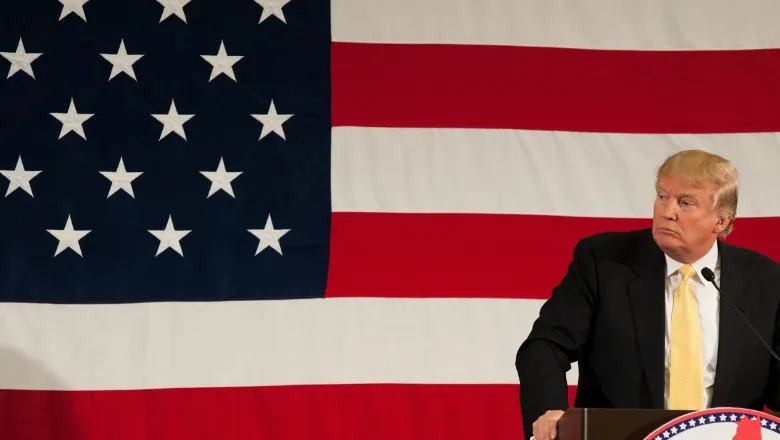As the world woke up to Trump's victory in the US elections, academics at King's College London shared their reflections on what the result could mean across key policy areas.

King's academics explored the likely implications of Trump's return to the White House on the global economy, the war in Ukraine, international relations, US foreign policy, reproductive health and the US political landscape.
On the economy, Professor Jonathan Portes, Professor of Economics and Public Policy, reflected on the potential impact of Trump's proposed tariff increases.
If Trump does indeed implement very large across-the-board tariff increases, this will be a severe shock to the global economy, including the UK.
Professor Jonathan Portes, Professor of Economics and Public Policy.
He continued: Moreover, the US current fiscal trajectory is unsustainable over the medium term. While a major crisis is unlikely in the short-term, Trump's tax cuts would certainly raise the risk of higher long-term interest rates -which would further damage both the UK economy and our fiscal position."
In his victory speech, Trump claimed that he's going to 'stop wars' and there have been ongoing concerns around continued support for Ukraine under a Trump presidency.
However, Professor Sam Greene, Professor of Russian Politics, said: "Ukraine is unlikely to be the most important thing on Trump's agenda, and he will quickly find himself embroiled in the push and pull of politics in Washington.
"An abject American capitulation to Russia's ambitions in Ukraine would, of course, be disastrous to American national security and its broader interests. Whether Trump actually cares about that is a different story. But it is also unlikely to win him any political capital in DC, and in fact it is likely to cost him quite a bit, and that's something he does care about, or at least something he has cared about in the past."
Reproductive health has been an emotive issue throughout the election campaign, with Kamala Harris fiercely defending reproductive rights in her campaign.
Dr Rishita Nandagiri, Lecturer in Global Health and Social Medicine, reflected on the global impact of Trump's victory and outlined how we are seeing a rise in 'anti-gender' and right-wing political movements globally such as in Poland, Chile, Germany.
She said having Trump as US president increases concerns that it will supercharge these movements globally not just through the fortification of international coalitions like the so-called Geneva Consensus, but also through increased funding for anti-abortion and 'anti-gender' efforts globally, whilst simultaneously restricting access to global health funding and aid through reinstating and expanding the Global Gag Rule.
This could have a catastrophic impact on pregnant people's health - not only abortion seekers - and all reproduction-related healthcare in countries around the world.
Dr Rishita Nandagiri, Lecturer in Global Health and Social Medicine
The election result also raised questions on the future of the US Political landscape and signalled a potential shift of the Republication party to more extreme policy commitments.
Dr Georgios Samaras, Assistant Professor of Public Policy in the International School for Government reflected on the significance of this outcome.
The impact of Trump's victory on international relations and global security were also key areas of focus.
Dr Zeno Leoni, Lecturer in Defence Studies and Lau China Institute affiliate at King's College London, reflected on what the outcome could mean for international relations and security in China and the Middle East.
He said the Biden administration leveraged relationships with allies in an effort to decouple from and contain China by supporting minilateral initiatives such as AUKUS, the Quad, the Squad, the semiconductor alliances among other things. These were initiatives informed by the principle of friend-showing.
While it is unlikely that the Trump administration will undermine these initiatives - especially since these are mostly aimed at China - there is a chance it will lead the US to withdraw to even more international agreements, reduce engagement with multilateral institutions in which the US has lost influence due to the rise of emerging economies, exert pressures on closest allies within the so-called anglosphere - such as the Five Eyes - to support US containment of China with even greater energy.
Dr Zeno Leoni, Lecturer in Defence Studies and Lau China Institute affiliate at King's
He also commented on how it might affect events in the Middle East given Trump's track record in his first term as president when he scrapped the Iran nuclear deal and supported the US embassy in Jerusalem.
"Although the Biden administration has been unable to rein in Netanyahu's assertive security policy, a Trump administration will be even more inclined to let him and any incoming prime minister in Israel to continue to pursue a military offensive to securitise Israel's border."
Trump's said he will give Robert F. Kennedy Jr a major health role during his second term as president. Antimicrobial resistance is a growing global threat and the development of new antibiotics, vaccines, and diagnostics needs urgent attention and support from the new government, Dr Lindsey Edwards, a Principal Investigator at the Centre Host Microbiome Interactions says.
"The United States is both one of the world's largest producers and consumers of meat and antibiotics, a combination that significantly contributes to antimicrobial resistance. American agriculture is highly reliant on antibiotics, particularly in livestock production, where they are often used to promote growth and prevent disease in densely populated animal environments. This practice, however, plays a role in accelerating the development of antibiotic-resistant bacteria, as frequent and widespread antibiotic use creates an environment in which only the strongest, most resistant bacteria survive and multiply.
"It is imperative that the incoming Trump government recognises the seriousness of AMR and continues to support initiatives aimed at combating this threat."











